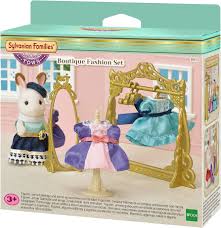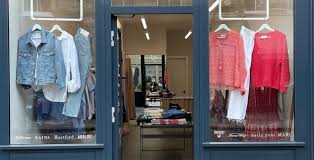Discover the Elegance of a Women’s Clothing Boutique: Where Style Meets Sophistication
Exploring the Charm of Women’s Clothing Boutiques
Women’s clothing boutiques are more than just stores; they are havens of style, sophistication, and individuality. Step into a women’s boutique, and you’ll be greeted by a curated selection of garments that are as unique as they are beautiful.
One of the most enchanting aspects of women’s clothing boutiques is the personalised shopping experience they offer. Unlike large retail chains, boutiques provide a more intimate setting where customers can receive individual attention from knowledgeable staff who understand the latest trends and how to style them.
Moreover, women’s clothing boutiques often feature handpicked collections that showcase emerging designers and exclusive pieces not found in mainstream stores. This exclusivity adds a touch of luxury to the shopping experience, making every purchase feel special and one-of-a-kind.
Another allure of women’s clothing boutiques is their focus on quality over quantity. Boutique owners take pride in selecting high-quality fabrics and ensuring meticulous craftsmanship in every garment they offer. This emphasis on quality not only enhances the longevity of the clothes but also elevates the overall shopping experience.
Furthermore, women’s clothing boutiques often serve as community hubs where like-minded fashion enthusiasts can gather, share styling tips, and connect over their love for beautiful apparel. Whether it’s attending a trunk show or participating in a styling workshop, boutique events create a sense of camaraderie among customers who appreciate fine fashion.
In conclusion, women’s clothing boutiques embody a blend of elegance, exclusivity, and personalisation that sets them apart from traditional retail outlets. By embracing the charm of boutique shopping, women can elevate their style sensibilities and discover pieces that truly reflect their individuality.
Frequently Asked Questions About Our Women’s Clothing Boutique: Trends, Sizing, Sustainability, and More
- 1. What are the latest trends in women’s fashion available at your boutique?
- 2. Do you offer a range of sizes to cater to different body types?
- 3. Are your garments made from sustainable and ethical materials?
- 4. Can I schedule a personal styling session at your boutique?
- 5. Do you have a return or exchange policy for items purchased at your boutique?
- 6. Are there any upcoming sales or promotions happening at your women’s clothing boutique?
- 7. How often do you update your inventory with new arrivals?
1. What are the latest trends in women’s fashion available at your boutique?
Discovering the latest trends in women’s fashion at our boutique is an exciting journey that combines style and individuality. Our curated collection showcases a diverse range of contemporary trends, from chic minimalism to bold prints and vibrant colours. Whether you’re looking for timeless classics or cutting-edge designs, our boutique offers a selection that caters to every fashion preference. Our knowledgeable staff is dedicated to staying ahead of the curve, ensuring that you have access to the freshest styles and most sought-after pieces. Embrace the latest trends with confidence and flair as you explore our ever-evolving collection at the forefront of women’s fashion.
2. Do you offer a range of sizes to cater to different body types?
At our women’s clothing boutique, we take pride in offering a diverse range of sizes to cater to various body types. We understand that every woman is unique, and we strive to ensure that our collection is inclusive and accessible to all. Whether you’re petite or curvy, we believe that fashion should be empowering and flattering for every body shape. Our commitment to providing a wide size range reflects our dedication to celebrating diversity and helping every customer feel confident and beautiful in our garments.
3. Are your garments made from sustainable and ethical materials?
In response to the frequently asked question about the sustainability and ethics of our garments, we take pride in ensuring that our clothing at the women’s boutique is crafted from sustainable and ethical materials. We are committed to promoting environmentally friendly practices and supporting fair labour conditions throughout our supply chain. From organic cotton to recycled fabrics, we source materials that not only look and feel beautiful but also align with our values of social responsibility and environmental stewardship. Rest assured that when you choose our garments, you are making a conscious choice towards a more sustainable and ethical fashion industry.
4. Can I schedule a personal styling session at your boutique?
Certainly! At our women’s clothing boutique, we offer the opportunity for customers to schedule personal styling sessions tailored to their individual preferences and needs. Our experienced stylists are here to provide expert guidance on selecting outfits that complement your style, enhance your confidence, and make you feel fabulous. Whether you’re looking for a complete wardrobe refresh or need assistance in finding the perfect outfit for a special occasion, our personalised styling sessions ensure that you leave our boutique looking and feeling your best. Simply reach out to us to schedule your appointment and embark on a styling journey that is as unique as you are.
5. Do you have a return or exchange policy for items purchased at your boutique?
At our women’s clothing boutique, we understand the importance of ensuring customer satisfaction with every purchase. Therefore, we have a flexible return and exchange policy in place for items bought at our boutique. If for any reason you are not completely satisfied with your purchase, we are happy to offer exchanges or returns within a specified timeframe, provided that the items are in their original condition with tags attached. Our goal is to make sure that you feel confident and delighted with your shopping experience at our boutique, knowing that your satisfaction is our priority.
6. Are there any upcoming sales or promotions happening at your women’s clothing boutique?
Customers often inquire about upcoming sales or promotions at our women’s clothing boutique. We understand the excitement of scoring a great deal on stylish pieces, and we strive to keep our valued patrons informed about any upcoming sales or promotions. At our boutique, we periodically offer special discounts, seasonal promotions, and exclusive deals to make your shopping experience even more delightful. Keep an eye on our website or social media channels for announcements regarding upcoming sales and promotions, as we are dedicated to providing our customers with opportunities to indulge in high-quality fashion at exceptional value.
7. How often do you update your inventory with new arrivals?
At our women’s clothing boutique, we take pride in regularly refreshing our inventory with new arrivals to offer our customers the latest trends and styles. We understand the importance of staying ahead in the fast-paced world of fashion, so we diligently update our collection with fresh pieces to ensure that every visit to our boutique brings a delightful discovery. Whether it’s seasonal updates or exclusive launches, we strive to keep our inventory dynamic and exciting for our discerning clientele.

